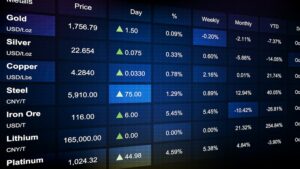Commodity Trading
Diversify your trading portfolio with major commodities like oil. Build a strategy based on your view of the role commodities will play in national economies, where demand can signal slowdowns or future growth.

Why Trade Commodity CFDs?
-
Portfolio Diversification
Commodities are a vital part of a balanced portfolio model. -
A Key Factor
In particular, the price of oil is a key factor in the global economy. -
Trading Opportunities
Oil markets often trend well, which can offer good trading opportunities.
Trading Commodities CFDs with Hantec Markets
Available Symbols
13+
Starting Deposit
$10
Spreads From
0.2
Maximum Leverage
500:1
Commodity Trading Conditions
US Oil
| Target Spread | 0.05 |
| Pip Cost (Native CCY) | $1.00 |
| Min. Trade Size | 1 |
| Maximum Lots per Trade | 100 |
| Margin Requirement Per Min Trade Size USD* | 5% |
| Minimum Stop Distance (Points) | 0.1 |
| Trading hours (London Time)** | Sunday 23:05 – Friday 24:40 |
| Break Time (London Time)** | Daily from 22:00 until 23:00 |
| Minimum Funding | $10 |
| Leverage | up to 1:500 |
| Commissions | None |
| Spread Type | Floating |
| Stop out Level*** | Equity = 40% of used margin |
| Server Time | GMT+3 |
| Account Denomination | USD, EUR, GBP, CHF, CAD, AUD, PLN & AED |
UK Oil
| Target Spread | 0.05 |
| Pip Cost (Native CCY) | $1.00 |
| Min. Trade Size | 1 |
| Maximum Lots per Trade | 100 |
| Margin Requirement Per Min Trade Size USD* | 5% |
| Minimum Stop Distance (Points) | 0.1 |
| Trading hours (GMT+2)** | Monday 01.00 – Friday 21.45 |
| Break Time (GMT+2)** | Daily from 22.15 until 01.00 |
| Minimum Funding | $10 |
| Leverage | up to 1:500 |
| Commissions | None |
| Spread Type | Floating |
| Stop out Level*** | Equity = 40% of used margin |
| Server Time | GMT+3 |
| Account Denomination | USD, EUR, GBP, CHF, CAD, AUD, PLN & AED |
Aluminium
| Average Spread (points) | 100 |
| Min. Trade Size | 1 |
| Maximum Lots per Trade | 10 |
| Margin Requirement | 5% |
| Minimum Stop Distance (Points) | 2 |
| Trading hours (London Time)** | 00:02 – 16:59 |
| Break Time (London Time)** | Daily from 21:58 – 22:03 |
| Minimum Funding | $/£/€ 1,000 |
| Leverage | up to 1:500 |
| Commissions | None |
| Spread Type | Floating |
| Stop out Level*** | Equity = 40% of used margin |
| Server Time | GMT+3 |
| Account Denomination | USD, EUR, GBP |
Zinc
| Average Spread (points) | 100 |
| Min. Trade Size | 1 |
| Maximum Lots per Trade | 10 |
| Margin Requirement | 5% |
| Minimum Stop Distance (Points) | 2 |
| Trading hours (London Time)** | 00:02 – 16:59 |
| Break Time (London Time)** | Daily from 21:58 – 22:03 |
| Minimum Funding | $/£/€ 1,000 |
| Leverage | up to 1:500 |
| Commissions | None |
| Spread Type | Floating |
| Stop out Level*** | Equity = 40% of used margin |
| Server Time | GMT+3 |
| Account Denomination | USD, EUR, GBP |
Lead
| Average Spread (points) | 100 |
| Min. Trade Size | 1 |
| Maximum Lots per Trade | 10 |
| Margin Requirement | 5% |
| Minimum Stop Distance (Points) | 2 |
| Trading hours (London Time)** | 00:02 – 16:59 |
| Break Time (London Time)** | Daily from 21:58 – 22:03 |
| Minimum Funding | $/£/€ 1,000 |
| Leverage | up to 1:500 |
| Commissions | None |
| Spread Type | Floating |
| Stop out Level*** | Equity = 40% of used margin |
| Server Time | GMT+3 |
| Account Denomination | USD, EUR, GBP |
Nickel
| Average Spread (points) | 500 |
| Min. Trade Size | 1 |
| Maximum Lots per Trade | 10 |
| Margin Requirement | 5% |
| Minimum Stop Distance (Points) | 2 |
| Trading hours (London Time)** | 00:02 – 16:59 |
| Break Time (London Time)** | Daily from 21:58 – 22:03 |
| Minimum Funding | $/£/€ 1,000 |
| Leverage | up to 1:500 |
| Commissions | None |
| Spread Type | Floating |
| Stop out Level*** | Equity = 40% of used margin |
| Server Time | GMT+3 |
| Account Denomination | USD, EUR, GBP |
Coffee Arabica
| Average Spread (points) | 500 |
| Min. Trade Size | 1 |
| Maximum Lots per Trade | 10 |
| Margin Requirement | 5% |
| Minimum Stop Distance (Points) | 2 |
| Trading hours (London Time)** | 08:15 -17:30 |
| Break Time (London Time)** | Daily from 21:58 – 22:03 |
| Minimum Funding | $/£/€ 1,000 |
| Leverage | up to 1:500 |
| Commissions | None |
| Spread Type | Floating |
| Stop out Level*** | Equity = 40% of used margin |
| Server Time | GMT+3 |
| Account Denomination | USD, EUR, GBP |
New York Cocoa
| Average Spread (points) | 10 |
| Min. Trade Size | 1 |
| Maximum Lots per Trade | 10 |
| Margin Requirement | 5% |
| Minimum Stop Distance (Points) | 2 |
| Trading hours (London Time)** | Daily from 21:58 – 22:03 |
| Break Time (London Time)** | 08:45 – 17:30 |
| Minimum Funding | $/£/€ 1,000 |
| Leverage | up to 1:500 |
| Commissions | None |
| Spread Type | Floating |
| Stop out Level*** | Equity = 40% of used margin |
| Server Time | GMT+3 |
| Account Denomination | USD, EUR, GBP |
Sugar No5
| Average Spread (points) | 20 |
| Min. Trade Size | 1 |
| Maximum Lots per Trade | 10 |
| Margin Requirement | 5% |
| Minimum Stop Distance (Points) | 2 |
| Trading hours (London Time)** | Daily from 21:58 – 22:03 |
| Break Time (London Time)** | 08:45 – 16:55 |
| Minimum Funding | $/£/€ 1,000 |
| Leverage | up to 1:500 |
| Commissions | None |
| Spread Type | Floating |
| Stop out Level*** | Equity = 40% of used margin |
| Server Time | GMT+3 |
| Account Denomination | USD, EUR, GBP |
Wheat
| Average Spread (points) | 30 |
| Min. Trade Size | 1 |
| Maximum Lots per Trade | 10 |
| Margin Requirement | 5% |
| Minimum Stop Distance (Points) | 2 |
| Trading hours (London Time)** | 00:00 – 12:45, 13:30 – 18:20 |
| Break Time (London Time)** | Daily from 21:58 – 22:03 |
| Minimum Funding | $/£/€ 1,000 |
| Leverage | up to 1:500 |
| Commissions | None |
| Spread Type | Floating |
| Stop out Level*** | Equity = 40% of used margin |
| Server Time | GMT+3 |
| Account Denomination | USD, EUR, GBP |
Cotton
| Average Spread (points) | 25 |
| Min. Trade Size | 1 |
| Maximum Lots per Trade | 10 |
| Margin Requirement | 5% |
| Minimum Stop Distance (Points) | 2 |
| Trading hours (London Time)** | 01:00 – 18:20 |
| Break Time (London Time)** | Daily from 21:58 – 22:03 |
| Minimum Funding | $/£/€ 1,000 |
| Leverage | up to 1:500 |
| Commissions | None |
| Spread Type | Floating |
| Stop out Level*** | Equity = 40% of used margin |
| Server Time | GMT+3 |
| Account Denomination | USD, EUR, GBP |
High-Grade Copper
| Average Spread (points) | 40 |
| Min. Trade Size | 1 |
| Maximum Lots per Trade | 10 |
| Margin Requirement | 5% |
| Minimum Stop Distance (Points) | 2 |
| Trading hours (London Time)** | 22:00 – 21:00 |
| Break Time (London Time)** | Daily from 21:58 – 22:03 |
| Minimum Funding | $/£/€ 1,000 |
| Leverage | up to 1:500 |
| Commissions | None |
| Spread Type | Floating |
| Stop out Level*** | Equity = 40% of used margin |
| Server Time | GMT+3 |
| Account Denomination | USD, EUR, GBP |
Natural Gas
| Average Spread (points) | 20 |
| Min. Trade Size | 1 |
| Maximum Lots per Trade | 10 |
| Margin Requirement | 5% |
| Minimum Stop Distance (Points) | 2 |
| Trading hours (London Time)** | 22:00 – 21:00 |
| Break Time (London Time)** | Daily from 21:58 – 22:03 |
| Minimum Funding | $/£/€ 1,000 |
| Leverage | up to 1:500 |
| Commissions | None |
| Spread Type | Floating |
| Stop out Level*** | Equity = 40% of used margin |
| Server Time | GMT+3 |
| Account Denomination | USD, EUR, GBP |
Commodity Trading Conditions
| Target Spread | 0.05 |
| Pip Cost (Native CCY) | $1.00 |
| Min. Trade Size | 1 |
| Maximum Lots per Trade | 100 |
| Margin Requirement Per Min Trade Size USD* | 10% |
| Minimum Stop Distance (Points) | 0.1 |
| Trading hours (London Time)** | Sunday 23:05 – Friday 24:40 |
| Break Time (London Time)** | Daily from 22:00 until 23:00 |
| Minimum Funding | $100 |
| Commissions | Included in the spread |
| Spread Type | Floating |
| Execution | Market Execution |
| Stop out Level*** | 50% |
| Server Time | GMT+3 |
| Account Denomination | USD, EUR, GBP, CHF, CAD, AUD, PLN & AED |
| Target Spread | 0.05 |
| Pip Cost (Native CCY) | $1.0 |
| Min. Trade Size | 1 |
| Maximum Lots per Trade | 100 |
| Margin Requirement Per Min Trade Size USD* | 10% |
| Minimum Stop Distance (Points) | 0.1 |
| Trading hours (London Time)** | Monday 01:05 – Friday 21:40 |
| Break Time (London Time)** | Daily from 22:00 until 01:00 |
| Minimum Funding | $100 |
| Commissions | Included in the spread |
| Spread Type | Floating |
| Execution | Market Execution |
| Stop out Level*** | 50% |
| Server Time | GMT+3 |
| Account Denomination | USD, EUR, GBP, CHF, CAD, AUD, PLN & AED |
New to trading?
Hantec has you covered
Our market leading Learning Hub is a free resource to help you become an accomplished and successful trader.
Commodity Trading FAQ
Why should you consider trading commodities?
Why should you consider trading commodities?
Maybe you’ve never traded commodities and focused instead on markets like shares or stock indices, or you’ve been introduced to the world of trading through currency markets.
There are three main reasons why you should consider looking at commodities markets:
- Portfolio diversification,
- The negative effect of psychological bias
- Higher volatility.
Portfolio diversification: A diversified portfolio across different asset classes are viewed as beneficial in terms of mitigating risks and providing a more balanced approach to investing and (to a lesser degree) trading.
Avoiding the ambiguity effect: The ambiguity effect is when you favour something familiar over another choice where the risk is less known. Because you understand another asset class and its potential returns better than, for example, commodities, you may avoid trading in a particular instrument — even though trading in them could potentially produce a better return. By educating yourself to the world of commodities and commodity trading you introduce new ways to diversify your trading.
Higher volatility: Generally speaking, many commodity markets exhibit a more volatile nature than stock indices and Forex markets. Daily price movements in commodity markets tend to be higher. This affords the leveraged trader more scope to make higher gains. If your trading style benefits from higher volatility, then commodity markets could be right for you. However, it must be remembered that with higher volatility comes potentially higher risk and the possibility of larger losses. Also, commodity markets won’t be as attractive if your trading style doesn’t benefit from higher levels of volatility.
Who are the commodity market participants?
Major market participants in commodities trading include commodities buyers and producers, investors, and speculators. Markets and exchanges were established initially to allow commodity producers and users of those commodities to exchange the commodity. As markets and exchanges have evolved to accommodate potential volatility of price movements, investors and speculators have become the major participants in commodity markets.
Glossary of terms
Bid
The rate at which you can sell the base currency, in our case it’s the Euro, and buy the quote currency, i.e the Japanese Yen.
Ask (or Offer)
The rate at which you can buy the base currency, in our case the British Pound, and sell the quoted currency, i.e. the Japanese Yen.
Spreads
The difference between the Bid and the Ask prices.
Currency rate
The value of one currency expressed in terms of another. Its fluctuation depends on numerous factors including the supply and demand on the market and/or open market operations by a government or by a central bank.
Lot
Usually contract size is based on a lot system, and for most currency pairs 1 lot is 100,000 units of a base currency.
Pip
Minimum rate fluctuation
Account types
Hantec Markets offer a variety of demo and live trading accounts including Joint and Corporate accounts.
Additional Information
Types of commodities
Commodities fall broadly into two categories: hard and soft commodities.
- Hard commodities: These are natural resources extracted from the earth such as precious metals (gold and silver), base metals such as copper and aluminium, plus energy products, such as oil and natural gas.
- Soft commodities: Soft commodities (often described as “softs”) are broadly comprised of livestock and agricultural products. Livestock can include pork or live cattle. Agricultural (or “ags”) can include wheat, cocoa, sugar and soybeans.
What influences commodity markets
Supply and demand: All markets are driven by the dynamics of supply and demand for the asset being bought and sold. In commodity markets, however, this is even more pronounced. A significant rise (or fall) in demand for any particular commodity will likely give rise to a notable rise (or fall) in the price for the commodity. Conversely, changes to the supply dynamics for a commodity will do the reverse.
The US Dollar: Most commodities are quoted and traded in US Dollars. This means that changes in the value of the US Dollar against other currencies can impact the price of commodities. Generally speaking (though this relationship can shift), there is an inverse correlation between the value of the US Dollar and the price level of commodities.
Global economic conditions: The health of the global economy can have a significant impact on the overall demand for, and supply of, various commodities – therefore impacting the price.
Examples of major global commodity exchanges and markets
There are now more than 50 global commodity exchanges trading in over 100 commodity types. These exchanges offer futures contracts primarily, with commodities as the underlying asset.
- The Chicago Board of Trade (CBoT) has been in existence since 1848 and offers trading in soybeans, wheat and corn, amongst many others.
- The Chicago Mercantile Exchange (CME) facilitates trading in lean hogs, cattle and lumber, with many other markets also listed to trade.
- The New York Mercantile Exchange (NYMEX) sees trading in gold, silver and other precious metals plus many others.
- The London Metals Exchange (LME) sees trading in base metals, including copper, aluminium, lead and zinc.
- The Tokyo Commodity Exchange (TOCOM) allows for trading in a wide variety of commodities.
Trade Commodity Online on MT4
Access the Hantec Markets MetaTrader4 platform, an award-winning technology available on desktop, mobile and Mac.
Commodity Trading: Related Articles

2024 Commodity Outlook: Expectations for Oil, Gas, Metals, and Agriculture. Get insider analysis on key factors impacting commodity prices like the Ukraine war, El Niño, Chinese economy, and more. Explore forecasts for gold, copper, natural gas, agricultural commodities, and other major trading instruments.







